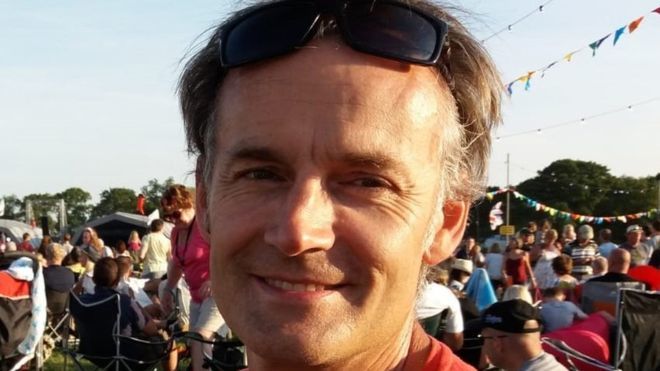 |
|
A British man linked to 11 coronavirus cases has spoken for the first time, saying he has "fully recovered" from the illness.
|
Steve Walsh, who remains quarantined in hospital, says his thoughts are with others who have contracted the virus.
He said his family have been asked to isolate themselves "as a precaution".
Meanwhile, Health Secretary Matt Hancock warned that the spread of the coronavirus would worsen before it improved.
"Dealing with this disease is a marathon, not a sprint," he told MPs in the Commons.
"We will do everything that is effective to tackle this virus and keep people safe."
Mr Walsh, from Hove, who works for a firm providing gas analysis equipment, caught the virus in Singapore and is thought to have infected 11 others at a French ski resort.
Five of the cases linked to Mr Walsh are in England, five are in France and one is in Majorca, Spain.
Two of the people who contracted coronavirus at the chalet where Steve Walsh stayed are Bob Saynor and his wife, Catriona Greenwood.
She worked as a locum GP at the County Oak medical centre in Brighton, which was temporarily closed on Monday.
Eight people have tested positive for the virus in the UK so far.
One of those infected is an A&E worker at Worthing Hospital in West Sussex, the Department of Health said on Tuesday.
All services at the hospital continue to operate as normal, a spokeswoman for the department said.
Public Health England is contacting the very small number of patients who were seen by the A&E worker, who had followed advice to self-isolate.
Quarantine powers 'proportionate'
There have now been more than 40,000 cases of coronavirus worldwide, which has been declared a global health emergency. The death toll in China stands at 1,016.
On Monday, the government issued new powers in England to keep people in quarantine to stop the virus spreading.
Under the Department of Health measures people will not be free to leave quarantine, and can be forcibly sent into isolation if they pose a threat.
Mr Hancock said these powers were "proportionate" and will "help us slow down transmission of the virus".
The health secretary also announced that "a capital facility" was being launched immediately "to support any urgent works the NHS needs for the coronavirus response, such as the creation of further isolation areas and other necessary facilities".
Speaking on a visit to Birmingham, Prime Minister Boris Johnson said the public had "every reason to be confident and calm" about the threat of the virus, adding: "We have got a fantastic NHS".
Meanwhile, the government has asked medical suppliers to carry out a risk assessment on the impact of coronavirus and travel restrictions introduced by the Chinese government.
Companies have also been asked to retain existing stockpiles of medical supplies, which had been compiled as a contingency measure ahead of Breixt, the Department of Health said.
The department said there were no current medicine shortages in the UK linked to the outbreak and the measures were precautionary.
Mark Carney, governor of the Bank of England, described the economic impact of the virus in the UK as "containable".
Mr Walsh contracted the coronavirus at a work conference in Singapore, before travelling to a French ski resort for a holiday on his way back to the UK.
In a statement from quarantine in Guy's Hospital in London, Mr Walsh, a cub scout leader, thanked the NHS for their care.
He said he contacted his GP, NHS 111 and Public Health England, on learning he had been exposed to a confirmed case of coronavirus.
He added: "I was advised to attend an isolated room at hospital, despite showing no symptoms, and subsequently self-isolated at home as instructed.
"When the diagnosis was confirmed I was sent to an isolation unit in hospital, where I remain, and, as a precaution, my family was also asked to isolate themselves."
He thanked friends, family and colleagues for their support, adding: "I ask the media to respect our privacy."
What are the symptoms of coronavirus and what can help stop its spread?
The main signs of infection are fever (high temperature) and a cough as well as shortness of breath and breathing difficulties.
Frequent hand washing with soap or gel, avoiding close contact with people who are ill and not touching your eyes, nose and mouth with unwashed hands, can help cut the risk of infection.
Catching coughs and sneezes in a tissue, binning it and washing your hands can minimise the risk of spreading disease.
Anyone experiencing symptoms, even if mild, after travelling from mainland China, Thailand, Japan, Republic of Korea, Hong Kong, Taiwan, Singapore, Malaysia or Macau, is advised to stay indoors and call the NHS 111 phone service.
In a statement, Servomex, Mr Walsh's employer, said it continues to "provide support" to him and his family.
It added that it had enforced travel restrictions and self-isolation for employees who attended the Singapore conference or who have shown symptoms of the virus.
Last month, two other people - who are related - were confirmed as having coronavirus after being taken ill at a hotel in York.
It was later revealed that one is a student at the University of York. BBC